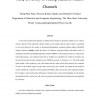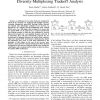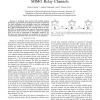26 search results - page 2 / 6 » Optimal Diversity Multiplexing Tradeoff Region in Asymmetric... |
CORR
2008
Springer
13 years 5 months ago
2008
Springer
This paper considers a multiple input multiple output (MIMO) two-way relay channel, where two nodes want to exchange data with each other using multiple relays. An iterative algor...
CORR
2006
Springer
13 years 5 months ago
2006
Springer
A cross-layer optimization approach is adopted for the design of symmetric random access wireless systems. Instead of the traditional collision model, a more realistic physical la...
VTC
2006
IEEE
13 years 11 months ago
2006
IEEE
— Based on the specification of a high-throughput wireless local area network system we consider the achievable rate regions of time, frequency and code division multiple access...
CORR
2008
Springer
13 years 5 months ago
2008
Springer
A multi-hop two-way relay channel is considered in which all the terminals are equipped with multiple antennas. Assuming independent quasi-static Rayleigh fading channels and chann...
GLOBECOM
2008
IEEE
13 years 11 months ago
2008
IEEE
—A multi-hop relay channel with multiple antenna terminals in a quasi-static slow fading environment is considered. For both full-duplex and half-duplex relays the fundamental di...



